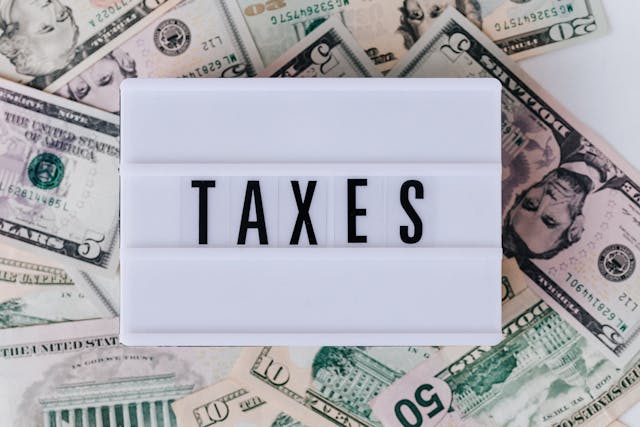Source: https://www.pexels.com/photo/quote-box-ontop-of-stack-of-paper-bills-4386372/
Business owners in Dallas must navigate specific tax rules which can greatly affect their profitability. Entrepreneurs who engage in strategic tax planning have the ability to reduce their tax obligations while ensuring they remain compliant with local, state, and federal tax laws.
What’s Inside This Guide
- Understanding the Dallas Tax Landscape
- Entity Structure Considerations
- Maximizing Deductions and Credits
- Quarterly Tax Planning Strategies
- Property Tax Management for Business Owners
Understanding the Dallas Tax Landscape
Dallas entrepreneurs must navigate multiple layers of taxation to comply with local regulations. Businesses find Texas appealing because there is no state income tax but businesses face significant alternative taxes.
Dallas businesses face a minimum sales tax rate of 8.25% which combines the Texas state tax rate of 6.25% with an additional local rate of 2%. Business owners need to understand collection requirements since this rate covers tangible personal property and specific services.
Although Texas does not require state income tax payments from businesses, it requires them to pay a franchise tax which functions as a business tax that entrepreneurs need to consider during financial planning. The state of Texas stands out as it does not levy personal income tax yet business owners must understand its distinct franchise tax approach.
Working with an affordable Dallas accounting firm can help you navigate these complexities. Dallas tax service specialists offer knowledge about regional tax regulations and assist with strategy development suited to your business needs.
Recent Tax Changes Affecting Dallas Businesses
Businesses must regularly update their understanding because tax regulations continue to change. New laws in Texas are designed to control property tax growth rates for residential and business properties. Dallas businesses will face significant impacts from newly implemented property tax caps and assessment changes.
Dallas might adjust its local sales tax rates to address revenue requirements. The range of taxable goods and services has been extended to cover certain digital products along with other offerings. Online marketplaces must adhere to more stringent tax collection rules when selling goods through third-party vendors.
Entity Structure Considerations
Dallas entrepreneurs prioritize selecting the appropriate business entity structure for optimal tax management. Each option carries different tax implications:
Sole Proprietorship
- Simplest structure with pass-through taxation
- Business income reported on personal tax return
- Subject to self-employment taxes
- No liability protection (personal assets at risk)
Limited Liability Company (LLC)
- Flexible taxation options
- Businesses have the option to select taxation as a sole proprietorship, partnership, or corporation.
- Offers liability protection
- Dallas small business owners highly value LLCs because of their adaptable nature.
S Corporation
- Pass-through taxation avoids double taxation
- Can help reduce self-employment taxes
- Requires more formalities than LLCs
- Must meet specific IRS requirements
Your unique business objectives along with future growth strategies and financial forecasts dictate which business structure is optimal. Dallas entrepreneurs discover major tax savings when they transform their sole proprietorships into S Corporations during business expansion periods.
Maximizing Deductions and Credits
How can you save more of your earned income?
Smart tax planning involves more than fulfilling your payment obligations because it requires using every legitimate deduction and credit that your business can access. By strategically planning deductions Dallas entrepreneurs can significantly lower their tax burden.
Business Expense Deductions
According to IRS regulations you can subtract “ordinary and necessary” business expenses from your taxable income. These include:
- Office rent and utilities
- Employee salaries and benefits
- Business travel and meals (50% deductible)
- Professional services (legal, accounting)
- Marketing and advertising costs
But here’s the thing most entrepreneurs miss…
Every business expense requires detailed record-keeping and proper documentation to ensure compliance. Tax deductions without sufficient proof can be rejected during audits resulting in penalties and interest charges.
Home Office Deduction
Running your business from home makes you eligible for the home office deduction. There are two methods:
- Simplified Method: You can claim $5 for each square foot of your home used for business activities as a deduction, not going beyond 300 square feet.
- Regular Method: Determine your home office’s real costs by totaling mortgage interest payments, insurance bills, utility expenses, repair costs, and depreciation values.
While the simplified method reduces complexity in tax filing it may also lead to a lower deduction amount. Dallas entrepreneurs who face high housing costs can obtain more substantial tax advantages through the regular method despite its complex calculation requirements.
Quarterly Tax Planning Strategies
Dallas entrepreneurs frequently commit the major error of postponing their tax planning until April.
Most tax-saving strategies become unimplementable after waiting until April to address taxes. The annual tax planning process includes quarterly assessments which help entrepreneurs make timely adjustments to their tax situation.
Estimated Tax Payments
Business owners usually make quarterly estimated tax payments because they don’t have taxes withheld from their paychecks like employees do. These payments are due:
- April 15 (for January to March)
- June 15 (for April to May)
- September 15 (for June to August)
- Business owners must submit their estimated tax payment for the September to December quarter by January 15 of the next year.
When these payments are neglected businesses face penalties alongside accruing interest. Hiring a tax expert to determine proper payment amounts enables you to prevent underpayment penalties and avoid excessive annual payments.
Property Tax Management for Business Owners
Business owners who own commercial real estate or utilize property for business operations in Dallas face substantial property tax expenses. The new Texas legislation seeks to control property tax increases for homeowners alongside commercial property owners.
Business owners can frequently win challenges against property tax assessments. Business properties receive higher-than-accurate valuations from tax authorities which leads to inflated tax payments.
Protesting Property Tax Assessments
You have the ability to protest your property assessment if you think it has been valued too high. The process typically involves:
- Entrepreneurs must submit their protests to the Dallas Central Appraisal District before the typical deadline of May 15.
- To support your argument you need to collect proof like comparable property value data.
- Presenting your case at a hearing
Dallas business owners frequently discover that investing in a contingency-based property tax consultant yields significant benefits.
Sales Tax Compliance in Dallas
Businesses that sell taxable goods or services in Dallas need careful sales tax management because the city’s total sales tax rate stands at 8.25%. Online marketplaces must now adhere to more rigorous tax collection standards when processing payments for third-party sellers.
Sales tax mistakes can result in substantial financial burdens because they require the payment of penalties, interest charges, and uncollected taxes. Many entrepreneurs make these common mistakes:
Common Sales Tax Pitfalls
- Misclassifying products or services: There are both tax-exempt products and taxable products on the market. Misclassification can lead to under or over-collection.
- Failing to collect tax on taxable services: Texas law requires taxes to be collected on various services such as specific repair work as well as maintenance and cleaning operations.
- Not keeping up with nexus rules: Businesses with physical operations in different jurisdictions could be required to collect sales tax in those locations.
Wrapping Up Your Tax Strategy
Dallas entrepreneurs need precise attention to detail combined with strategic planning and proactive management when planning their taxes. Analyzing Dallas tax services’ distinct features and applying effective tax strategies enables businesses to decrease their tax responsibilities while remaining compliant with regulations.
Remember these key takeaways:
- Select the business entity structure that best fits your specific needs.
- Use all available deductions and credits to your advantage.
- Engage in tax planning at every point during the year instead of waiting until tax time.
- Keep up-to-date with changes to local taxation that will impact Dallas-based businesses.
Investing time in tax planning now will generate significant savings in the future which allows you to expand your business through reinvestment. Through effective planning you can transform tax compliance into a competitive edge for your Dallas business.




